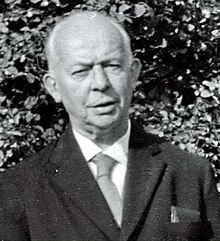Eberhard Wolfgang Giese
Eberhard Wolfgang Giese (born August 8, 1884 in Breslau ; † July 11, 1968 in Görlitz ) was a German administrative officer and author until the National Socialists came to power. After the end of the Second World War, he was the first post-war councilor for welfare and chairman of the local cultural association of Görlitz.
Live and act
Eberhard W. Giese, after completing his professional training, was first 19 years city inspector in his hometown of Breslau from 1903 , then until 1927 head of the welfare office in Sprottau and director of the welfare and employment office in Waldenburg . As early as 1914, he had also dealt with the social problems of his time as a journalist, such as the warrior homes , alcohol abuse and youth welfare, and later in Görlitz with the history of a large urban proletarian house . His social commitment led him to the SPD in 1919 . The administrative specialist was unanimously elected director of the welfare, youth and health department by the Görlitz city council in 1928 and held his office until the Nazis came to power. Giese is not spared from their sweeping over all democrats in office. He was deported to the cemetery office in a low-ranking position. Mentally he overcame the time of National Socialism by meeting his wife Margarete, nee. Klinkhart, a drawing teacher at the Luisen Lyceum, devoted more interest to artistic and cultural history.
Two days after the end of the war he was appointed by the Soviet commander as a councilor for welfare, but then transferred back to the cemetery office on charges of "social democracy". In the period that followed, his cultural and local historical initiatives came into play again, such as the “Künstlerklause” set up in the Reichenbacher Tower , where he worked for a long time as a volunteer “ Türmer ”, and the book “Der Türmer tells Görlitzer Sagen”. His most important legacy remains the diary in eleven large volumes, the Giese Chronicle , a document of contemporary history that reproduces personal experiences and documentaries from 1938 to 1947.
Works
- It's not that bad (comedy), premiere in the City Theater Ratibor. undated
- On the hiking trail and sailing slope. Adventure of a flock of young pilots. Wroclaw 1935.
- Giese Chronicle 1938–1947 from the estate of the sole heir Dr. Paul-Hermann Opitz in the Görlitz Council Archives.
- Studbook of the Görlitzer Künstlerklause from July 31, 1946. Lost after Giese's death. Today in the Görlitz Municipal Collections.
- The tower keeper tells Görlitz legends. Görlitz-Zittau 1954.
Web links
- Literature by and about Eberhard Wolfgang Giese in the bibliographic database WorldCat
Individual evidence
- ^ Ronny Kabus: Eberhard Wolfgang Giese - A Görlitzer Personality. In: The tower keeper tells Görlitz legends. 4. edit u. extended New edition of the first edition from 1954, Zittau 2018, p. 7 f. ISBN 978-3-929744-94-1 .
- ↑ Ronny Kabus: "... I cry for my father every day" - under the control of Stalin and the SED. 2. edit again u. extended Edition 2016, pp. 17–27. ISBN 978-3-7392-4237-8 .
- ^ Roland Otto: The Görlitzer diary of Eberhard W. Giese in the council archive. Görlitzer Magazin, Görlitz 1998, pp. 157–159.
- ↑ Roland Otto: The Görlitzer cultural and intellectual life 1938-1942 from the point of view of Eberhard W. Giese. New Lusatian magazine Görlitz 1999.
| personal data | |
|---|---|
| SURNAME | Giese, Eberhard Wolfgang |
| BRIEF DESCRIPTION | Local politician and chairman of the cultural association in Görlitz |
| DATE OF BIRTH | August 8, 1884 |
| PLACE OF BIRTH | Wroclaw |
| DATE OF DEATH | July 11, 1968 |
| Place of death | Goerlitz |
